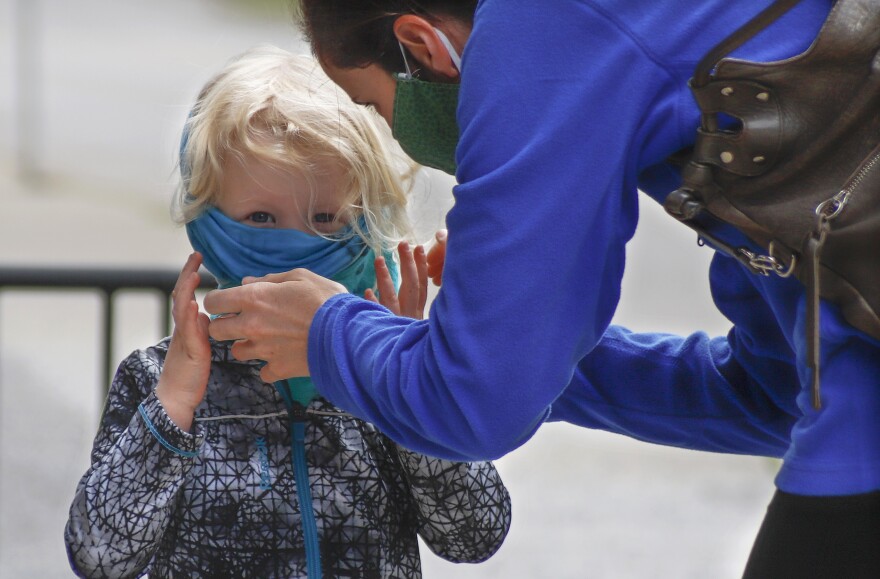On today’s episode of The Confluence: A legislative panel has affirmed the school mask mandate from the state Department of Health, but reporter Stephen Caruso with the Pennsylvania Capital-Star says Republicans are still hoping to overturn the order; a University of Pittsburgh researcher will soon use NASA’s newest telescope to look at faraway objects with infrared light; and a look at how one Pittsburgh TikToker is using the platform to share stories of everyday life from neighbors and strangers.
A legislative committee has found Gov. Tom Wolf’s school mask order was properly implemented
(0:00 - 8:04)
In late summer, as educators were preparing for a new school year with students in their buildings, Gov. Tom Wolf said he would leave it up to school districts to decide whether students and staff would wear masks.
Wolf changed his mind, and effective Sept. 7, the health department mandated the wearing of masks in all schools through grade 12.
That set off complaints and legal challenges across the state, but last week, a legislative panel, the Committee on Documents, found Wolf’s school mask mandate was properly implemented under his office’s existing powers.
“[The Committee on Documents is] this very obscure committee of 11 people, it’s lawyers, legislators, one of Wolf’s cabinet secretaries, and someone from the attorney general’s office, and their entire job is to decide if an action is a regulation or not,” explains Stephen Caruso, who covers the state House for Pennsylvania Capital-Star.
“It’s just important for this mask order because what Republicans tried to argue was the order should have been a regulation,” which would have been a much longer process, says Caruso.
The committee voted 7 to 4, and found Alison Beam, Acting Secretary of Health, was within her powers to issue a school mask order, and that action did not require any sort of regulatory review.
One of the dissenting voices was House Speaker Bryan Cutler said Gov. Wolf could have just as easily enacted a mask order through a regulatory process.
“It’s the fight about executive power: Has Wolf overstepped? Has he cut people out while trying to address the pandemic, or is he doing what he has to do as COVID cases rise in school?” asks Caruso.
New space telescope will help astronomers understand how planets formed
(8:16 - 18:11)
A telescope that could look back through time to the origins of the universe will be launched into space this December.
NASA’s James Webb Space Telescope will start documenting and assisting scientists with their research in 2022, after blasting into space and assembling itself.
“It improves upon the precursor, the Hubble Space Telescope in a couple of different ways,” says Rachel Bezanson, an observational astronomer and assistant professor in the Department of Physics and Astronomy at the University of Pittsburgh.
“The first way, and the most obvious way, is that it has a much larger mirror. It can collect more light at a given time,” says Bezanson. “The other way that the James Webb Space Telescope, or JWST, is really exciting is that its instruments are most sensitive to very, very red light, so light that pushes into the infrared.”
Bezanson says the telescope has to be in space to collect images because the earth’s atmosphere only has small windows to see infrared light.
Bezanson’s project will use the JWST to collect images that, in a way, see back in time.
“Light travels at a finite speed, we refer to that as the speed of light, which is very fast but not infinitely fast. That means when you look at a distant object, it’s taken some time for the light to travel from that object to your eyes,” explains Bezanson. “When you start to look at much more distant objects, where the light has been traveling from those objects for billions of years, essentially you’re seeing those objects and the universe as they were billions of years in the past.”
Bezanson says she’s most excited for the research to help inform how other stars and planets start to form.
“If nothing else, I can tell you that the pictures are going to be beautiful, and they’ll inspire the next generation of students,” says Bezanson.
Bezanson’s project is one of 286 that the telescope will support in its first year of research. The telescope is set to launch December 18, and will take a month to travel to its final destination, the Lagrange point, where it will orbit while collecting images.
Pittsburgh TikToker is finding joy interacting with neighbors and strangers
(18:20 - 22:30)
TikTok is known for its trending dance videos, comedy and quirky pranks. Many flocked to the app during the pandemic to feel connected.
90.5 WESA’s Katie Blackley reports, one Pittsburgh TikToker shares neighbors’ stories of love, heartbreak and the secret of life.
The Confluence, where the news comes together, is 90.5 WESA’s daily news program. Tune in Monday to Thursday at 9 a.m. and 7:30 p.m. to hear newsmakers and innovators take an in-depth look at stories important to the Pittsburgh region. Find more episodes of The Confluence here or wherever you get your podcasts.






